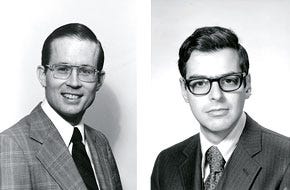Noise!
It matters. Fischer Black on the Limits of Our Models

The much-derided “dismal science” of economics is easier to appreciate as a history of thought rather than as an explanatory science. While the development of economic theory tracks our rapidly developing technological and computing capabilities, it tends to lag behind the accompanying complexity of our economy and financial markets. The post-WW2 era was something of a heyday for academic finance. Between the 1950s and 1980s, Harry Markowitz, William Sharpe, Jack Treynor, Franco Modigliani, Myron Scholes, and Merton Miller formed the foundation, rather the glossary, of modern quantitative finance. Their ideas and contributions are taken largely for granted today, as financial author Aaron Brown writes,
Time has coalesced pre-1980 finance work into a consensus. Fierce disputes have mellowed as different approaches have turned out to be consistent or special cases of more general principles…It is easy for today’s students to view the entire generation of finance researchers as a homogenous team, working harmoniously toward a common goal.
Fischer Black is a central character in those disputes and breakthroughs. A mathematics Ph.D. that floated between the private sector and academia his entire career, Black often had to co-author papers to earn economic and finance theorists’ acceptance. An outsider in both realms, his odd demeanor made him a cipher even for those with whom he worked closely.
Black sought to distill problems into their most crucial elements. He eschewed overly complex, advanced mathematical models which he felt were brittle and exposed to the instability and unpredictability of the real world. His most famous contribution, the Black-Scholes option pricing model, completely revolutionized the derivatives market, yet requires just five readily observable inputs.
His penchant for simplification was not reductive, in fact, Black had a better appreciation for the unquantifiable than many of his peers. Black’s 1986 Journal of Finance essay “Noise” explores the limitations of our financial, econometric, and macroeconomic models.
“Noise in the sense of a large number of small events is often a causal factor much more powerful than a small number of large events can be.”
Stock traders acting on specious theories of price movement, investors with a preternatural preference for cash dividends, or the changing attitudes of consumers are impossible to measure but plainly impact markets for both real and financial assets. This aggregation of many small causal factors, “keeps us from knowing the expected return on a stock or portfolio. It keeps us from knowing whether monetary policy affects inflation or unemployment. It keeps us from knowing what, if anything, we can do to make things better.”
Unlike many academics, Black didn’t view these as troublesome statistical anomalies but regarded them as fundamental to stock prices, price levels, and business cycles. Humans are often irrational and our calculations are fallible. Models are designed to dull these realities yet Black believed they were where the real stuff of economics occurred.
There is no single factor that causes stock prices to stray from theoretical values, nor even a small number of factors. There is no single variable whose neglect causes econometric studies to go astray. And there is no simple single or multiple factor explanation of domestic or international business fluctuations.
Economics seeks to mimic the equilibrium of natural sciences. Whereas physics is immutably constrained by the Laws of Thermodynamics, Economics is a social science that lacks a true natural order. In its absence, theorists use “utility” to ground economic interactions. The simplifying assumption that rational actors will use the information available to maximize their wealth is the defining constraint of economics. But even practical definitions of wealth are hard to observe.
For most people, the value of their human capital is likely most salient to their own sense of economic well-being. The value of one’s human capital is not directly observable and certainly not the aggregate value of everyone’s human capital in the economy.
It's actually easier to list observables than unobservables, since so many things are unobservable…Thus econometric studies involving economic variables are hard to interpret for two reasons: first, the coefficients of regressions tell us little about causal relations even when the variables are observable; and second, the variables are subject to lots of measurement error, and the measurement errors are probably related to the true values of the variables.





